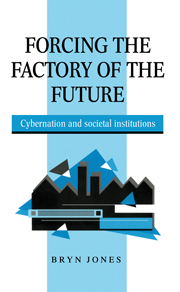Book contents
- Frontmatter
- Contents
- List of figures
- List of tables
- Acknowledgements
- List of acronyms and abbreviations
- Part I The workshop versus the factory
- Part II Technologies of control
- Overview
- 4 Technological evolution and the pathology of batch production
- 5 Numerical control, work organisation and societal institutions
- Part III Cybernation and flexibility
- Appendix: sources and methods
- Notes
- Bibliography
- Index
5 - Numerical control, work organisation and societal institutions
from Part II - Technologies of control
Published online by Cambridge University Press: 06 July 2010
- Frontmatter
- Contents
- List of figures
- List of tables
- Acknowledgements
- List of acronyms and abbreviations
- Part I The workshop versus the factory
- Part II Technologies of control
- Overview
- 4 Technological evolution and the pathology of batch production
- 5 Numerical control, work organisation and societal institutions
- Part III Cybernation and flexibility
- Appendix: sources and methods
- Notes
- Bibliography
- Index
Summary
Plant managers don't choose between Fordism, Taylorism and their successors. For some academic analysts technological change means managements, especially ‘successful’ managements, making explicit decision-making reviews of the relevant aspects of their operations. Rational choices are made according to the goals the firm as a collective manager seeks to achieve. Outsiders may criticise the scope of these goals, but within these limitations it is assumed that deliberate decisions are made (cf. Bessant et al. 1992). The more articulate ‘strategic choice’ theories of this kind have been criticised for their failure to take account of the ways in which differences in participants' organisational power and normative outlooks restrict and shape decisions (Thomas 1994, pp. 213–31). In the case of NC/CNC it seems that participants' paradigms rarely ‘saw’ the implementation as requiring decisions on reorganisation. Often they were not consciously deciding, but merely following – from current paradigms – the habitual practices defined by national institutions for labour management, industrial relations and occupational responsibilities.
In theory, those who adopted NC or CNC technology encountered a myriad of potential and potent decisions about organising and staffing. Questions about departmental responsibility of programming and planning, about management control of the supply and monitoring of parts and tooling, about locating the new machines amongst existing machining sections or in their own special areas, and whether existing shopfloor managers, or a new category of NC supervisors should supervise. An especially significant issue from our point of view concerned work organisation.
- Type
- Chapter
- Information
- Forcing the Factory of the FutureCybernation and Societal Institutions, pp. 101 - 126Publisher: Cambridge University PressPrint publication year: 1997



